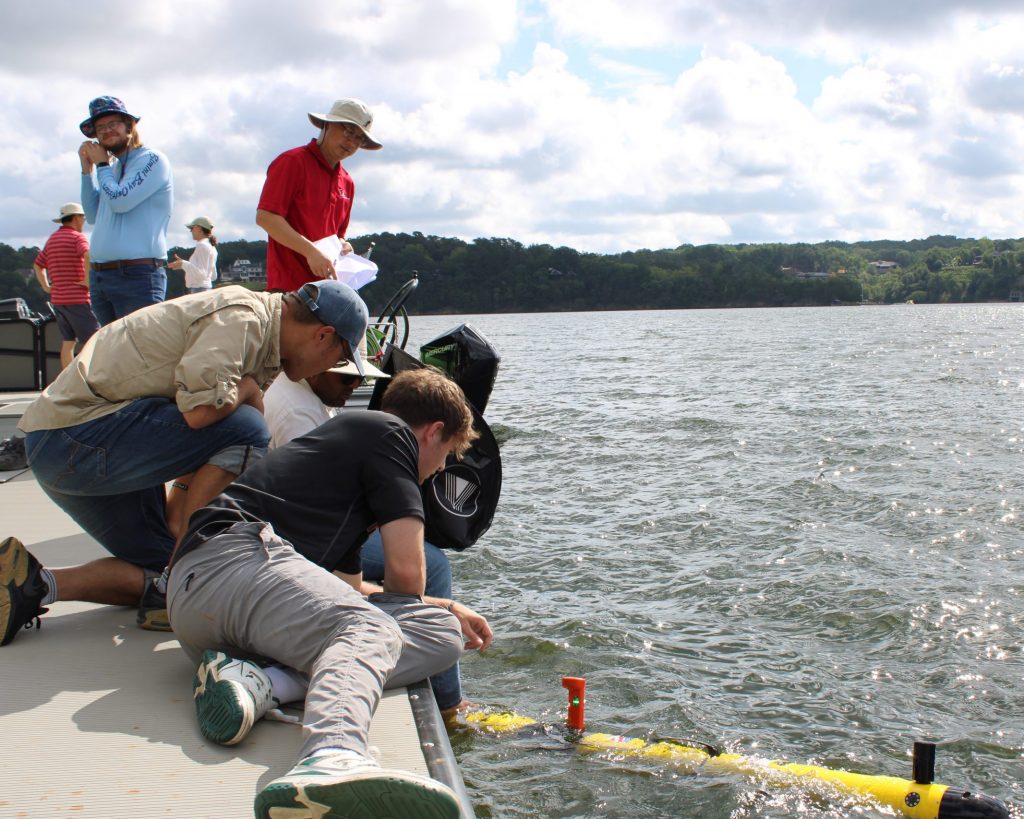
Dr. Aijun Song, associate professor in the Department of Electrical and Computer Engineering, and his research team successfully conducted multiple field demonstrations of underwater autonomous vehicles as next-generation water-observing technologies at the Black Warrior River and Lake Tuscaloosa. These demonstrations were part of the 2025 U.S. Geological Survey FLOW Academy.
The FLOW Academy is an eight-week summer program that introduces college students to real-world water challenges aligned with the mission of the USGS. Its goal is to attract top talent to careers in water sciences and technologies. The academy fosters collaboration between the on-campus Hydrologic Instrumentation Facility and University of Alabama experts in water-related disciplines.
Throughout the program, students received hands-on training in soldering, coding, solar power systems, edge computing and water sampling. They applied these skills through research projects focused on surface velocity imaging, rapid-deploy flood monitoring and autonomous sampling platforms. The program emphasized collaboration with USGS scientists and helped students strengthen technical, leadership and communication skills.
FLOW Academy participants took part in field visits to water observation facilities and technology demonstrations, including autonomous vehicle deployments led by Song. At the Black Warrior River, students observed the operation of small underwater robots, known as JaiaBots, and had the opportunity to deploy and retrieve the devices during the demonstration.
At Lake Tuscaloosa, Song’s team deployed a mid-sized autonomous underwater vehicle called EcoMapper. The team developed acoustic waveforms to transmit underwater signals, which researchers monitored in real time. Students received data from the vehicle as it operated several hundred yards offshore at Sharpes Landing.
“Autonomous platforms such as underwater vehicles will bring a paradigm shift in water-observing technologies,” Song said. “The USGS FLOW Academy is a perfect platform to promote these cutting-edge technologies.”

Song serves as a co-principal investigator for the FLOW Academy alongside Dr. Lisa Davis, associate professor and graduate program director in the Department of Geography. Dr. Steven Burian, professor in the Department of Civil, Construction and Environmental Engineering and director of science at the Alabama Water Institute, is the principal investigator. Song contributes emerging technologies such as underwater robotics and wireless sensor networks to the program.
Song’s research team is advancing underwater swarming technologies to enhance water monitoring. Their interdisciplinary work includes developing instrumentation, hardware, software and algorithms, as well as conducting field deployments. The team aims to create open-source, low-cost solutions for automated water data collection and rapid flood disaster response.
Looking ahead, the USGS FLOW Academy will continue to play a key role in advancing education in water sciences and technologies through hands-on, challenge-based learning. Successful projects like Song’s highlight the program’s impact on connecting academic research with real-world applications.